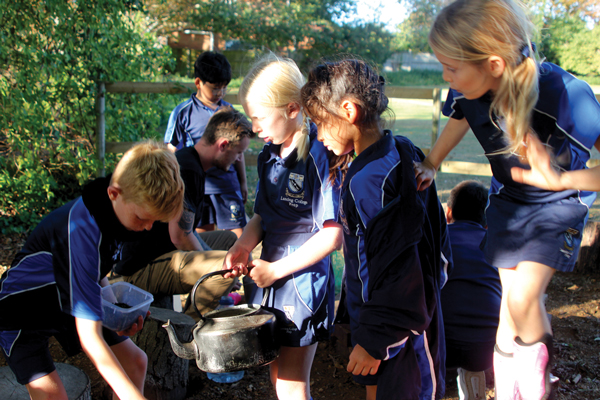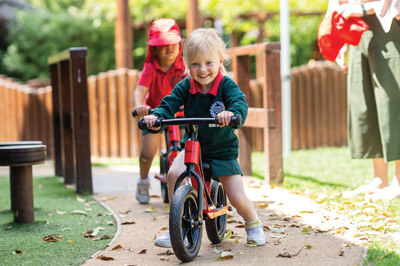
by Rachel Martini
Nursery Manager, Little Lancing Day Nursery & Forest School
There’s been a real buzz about Forest School in recent years – but what’s it all about and why is it becoming increasingly popular?
Forest School in the UK is based upon the Scandinavian concept of ‘friluftsliv’ – free air life – an open-air culture which has long been very much a way of life in those countries. It first made its way to the UK as long ago as 1993 and has grown in leaps and bounds since then, both here and around the world.
The UK Forest School Community, way back in 2011, came together to define the ethos of Forest School in this country. Broadly it is a child-centred learning process that inspires children through play, exploration and supported risk-taking. It inspires children to undertake hands-on learning experiences in a natural setting and builds confidence and self-esteem through regular play sessions.
The provision for Forest School covers a wide range. From Early Years settings that operate completely out of doors, to those nurseries and schools with bespoke outdoor learning spaces, to sessions for children that take place outdoors in their nursery garden or school grounds.
Whatever the format offered, Forest School is firmly aimed at sparking children’s curiosity with the world around them, building an awareness and connection with the natural world and using their outdoor environment to develop important life skills. It also gives children a chance to make connections and to experience fun and challenging activities, away from the lure of the electronic world they are growing up in. Yes they are becoming digital natives but they are first and foremost natives of the ‘real world’ too!
In summary, the six basic principles of Forest School are that it:
• Offers a long-term programme of frequent and regular sessions, with careful planning, adaptation, observations and then review.
• Takes place in a woodland or natural wooded environment, wherever possible, to support the development of a relationship between the learner and the natural world, although good Forest School practice can of course be well supported in other sites with only a few trees.
• Fosters resilient, confident, independent and creative learners, with experiences linked to home and nursery/school where appropriate.
• Provides learners with the opportunity to take supported risks appropriate to the environment and to themselves, using tools and fires where appropriate and within the framework of a baseline risk assessment.
• Is run by qualified practitioners with a minimum of an accredited Level 3 Forest School qualification, who continuously maintain and develop their professional practice. It has a high ratio of practitioner to learners. Practitioners hold up-to-date first aid qualifications, including paediatric elements.
• Uses a learner-centred pedagogical approach that is responsive to the needs and interests of learners, with play and choice an integral part of learning and development.
The benefits to young children of learning through play within the natural environment are clear to see. Forest School helps children to develop holistically, at their own pace, into resilient, confident, independent and creative learners. They learn teamwork skills building ‘nests’ or shelters and are encouraged to develop risk awareness through activities such as bushcraft. They instinctively use natural resources for inspiration, following the flow of the seasons to explore for example bluebells in spring, birds nesting and leaves changing colour in the autumn. They take learning outdoors and make connections with the natural world around them. At a time when climate and environmental issues are becoming critically important, Forest School is a great – and, we believe, essential – grounding for our future citizens.
Rachel Martini is the Nursery Manager at Little Lancing Day Nursery & Forest School. For further details please call 01273 465900 or visit www.littlelancing.co.uk




 Simple activities such as tree climbing and den building are rich in learning opportunities and should not be underestimated. When climbing a tree, children should be encouraged to consider their physical space, where their feet need to be placed, whether they feel comfortable and how high they think they should climb in order to stay safe. Parents should always be there to supervise but should contemplate the level of support given in order to develop their child’s own risk awareness and physical resilience. The simple act of climbing trees builds upper body strength, core stability and balance which are all gross motor skills which support progress in writing and Reception readiness.
Simple activities such as tree climbing and den building are rich in learning opportunities and should not be underestimated. When climbing a tree, children should be encouraged to consider their physical space, where their feet need to be placed, whether they feel comfortable and how high they think they should climb in order to stay safe. Parents should always be there to supervise but should contemplate the level of support given in order to develop their child’s own risk awareness and physical resilience. The simple act of climbing trees builds upper body strength, core stability and balance which are all gross motor skills which support progress in writing and Reception readiness. There is so much more to writing than tracing and forming letters. The simple act of taking your child to the woods gives them the chance to explore, climb trees, collect leaves and acorns, swing from branches, carry and roll logs and dig. These simple activities can all contribute to your child’s ability to be able to physically write when they enter their Reception year. Why not enhance your trip to the woods by taking some potato peelers and whittling freshly cut branches? A simple activity that teaches perseverance and concentration, requires force and control and uses both sides of the body, supporting progression in writing without actually writing.
There is so much more to writing than tracing and forming letters. The simple act of taking your child to the woods gives them the chance to explore, climb trees, collect leaves and acorns, swing from branches, carry and roll logs and dig. These simple activities can all contribute to your child’s ability to be able to physically write when they enter their Reception year. Why not enhance your trip to the woods by taking some potato peelers and whittling freshly cut branches? A simple activity that teaches perseverance and concentration, requires force and control and uses both sides of the body, supporting progression in writing without actually writing.
 PANTS stands for:
PANTS stands for:










